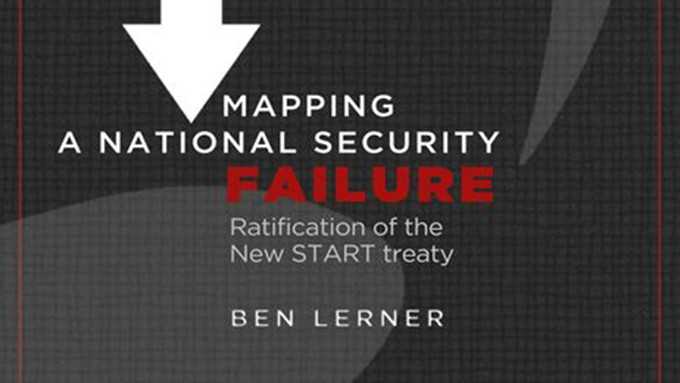Mapping a National Security Failure: Ratification of the New START Treaty

“A World without Nuclear Weapons”
The second contextual pillar on which President Obama’s pursuit of New START rested was his ambition to lead the effort to phase out nuclear weapons globally altogether. This agenda did not originate with President Obama, but he and his allies were straightforward about framing New START as one of its principal building blocks.
The movement to ban nuclear weapons globally has been around for several decades, but it gained significant mileage and, critically, bipartisan cover with the advent of the Global Zero campaign. Founded in late 2006 by two anti-nuclear activists, the campaign received an important boost from some unlikely sources in the form of a series of Wall Street Journal op-eds penned jointly by former Secretaries of State Henry Kissinger and George Shultz (who served under Presidents Nixon and Reagan, respectively), former Secretary of Defense Bill Perry (who served under President Bill Clinton), and former Senator Sam Nunn (D-Georgia), who had previously served as Chairman of the Senate Armed Services Committee.
In January, 2007, Mssrs. Kissinger, Shultz, Perry and Nunn (who would later come to be known collectively as the “four horsemen of the apocalypse”) fired their first critical shot in the pages of the Journal:
Nuclear weapons today present tremendous dangers, but also an historic opportunity. U.S. leadership will be required to take the world to the next state—to a solid consensus for reversing reliance on nuclear weapons globally as a vital contribution to preventing their proliferation into potentially dangerous hands, and ultimately ending them as a threat to the world…
…Reassertion of the vision of a world free of nuclear weapons and practical measures toward achieving that goal would be, and would be perceived as, a bold initiative consistent with America’s moral heritage. The effort could have a profoundly positive impact on the security of future generations…
…We endorse setting the goal of a world free of nuclear weapons and working energetically on the actions required to achieve that goal.[11]
The significance of these particular authors making this argument was considerable. As The Economist recently framed it:
…All were veterans of America’s cold-war security establishment with impeccable credentials as believers in nuclear deterrence…[s]uddenly, Global Zero was able to recruit people who were a far cry from the old ‘ban the bomb’ crowd.[12]
The “four horsemen” would continue to make their case the following year, with another Wall Street Journal piece in early 2008:
…With nuclear weapons more widely available, deterrence is decreasingly effective and increasingly hazardous… [I]nspired by [reaction to the Wall Street Journal essay from 2007], we convened veterans of the past six administrations…There was general agreement about the importance of the vision of a world free of nuclear weapons as a guide to our thinking about nuclear policies, and about the importance of a series of steps that will pull us back from the nuclear precipice.[13]
Notably, the first step mentioned is this “series of steps” was the extension of the verification provisions of the Strategic Arms Reductions Treaty (START) of 1991, which would expire in December 2009. The need for putting START verification mechanisms back in place would later become one of the arguments advanced by supporters of New START ratification.
The “Global Zero” agenda went on to receive its official boost from President Obama on 5 April, 2009, in Prague. This would constitute the President’s first explicit linkage between New START and his broader “de-nuclearization” ambitions:
So today, I state clearly and with conviction America’s commitment to seek the peace and security of a world without nuclear weapons. I’m not naïve. This goal will not be reached quickly—perhaps not in my lifetime. It will take patience and persistence. But now we, too, must ignore the voices who tell us that the world cannot change. We have to insist, ‘Yes, we can.’
Now, let me describe to you the trajectory we need to be on. First, the United States will take concrete steps towards a world without nuclear weapons. To put an end to Cold War thinking, we will reduce the role of nuclear weapons in our national security strategy, and urge others to do the same. Make no mistake: As long as these weapons exist, the United States will maintain a safe, secure and effective arsenal to deter any adversary, and guarantee that defense to our allies—including the Czech Republic. But we will begin the work of reducing our arsenal.
To reduce our warheads and stockpiles, we will negotiate a new Strategic Arms Reduction Treaty with the Russians this year. President Medvedev and I began this process in London, and will seek a new agreement by the end of this year that is legally binding and sufficiently bold. And this will set the stage for further cuts, and we will seek to include all nuclear weapons states in the endeavor.[14]
- Trump’s Election Was a Win in the Fight to Keep Gitmo Open - January 4, 2017
- NDAA and the Counter-Drone Challenge - December 23, 2016
- NDAA Takes On Counter-Drone Challenge - December 8, 2016
